Introduction to "The Sound of Music" |
Read more at in70mm.com The 70mm Newsletter |
| Written by: Transcription created March 2023. | Date: 20.09.2023 |
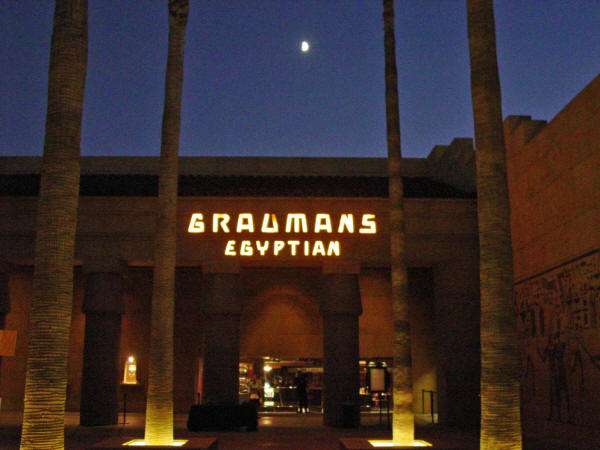 Egyptian
Theatre, Hollywood, USA in 2004/05. Picture by Paul Rayton Egyptian
Theatre, Hollywood, USA in 2004/05. Picture by Paul RaytonModerator: Good evening, ladies and gentlemen, and, I'd like to welcome you all back to the beautiful restored Lloyd E Rigler Theatre for the opening night of our weekend tribute to one of American cinema's greatest film makers, Mr. Robert Wise [applause]. And we're absolutely thrilled that Mr. Wise could be here with us this evening, along with a number of the other cast members from this wonderful film you're about to see, "The Sound of Music". We have with us Heather Menzies, Debbie Turner, Kym Karath is with us, and Duane Chase from the film. And they're going to be joining us afterwards for a Q&A about the making of this legendary musical. And in fact, given the times that we're in, I don't think there could be a better film to show tonight than "The Sound of Music". I'd just like to briefly thank some of the people who have come together to help us present this retrospective tribute. For the beautiful 70 millimeter print of "The Sound of Music", I'd like to thank Mr. Schawn Belston at 20th Century Fox. A huge round of applause, and I would like to thank our great friends at the Academy of Motion Picture Arts and Sciences Film Archive, Mike Pogorzelski, Joe Lindner and their entire staff, for the wonderful work that they've done in this new print. And I should tell you this is a new 70 millimeter print of "The Sound of Music" off of the original negative. And it has the original six track stereo mix presented in DTS, and for all of their help and support, I'd like to thank Paul Mueller and his staff at DTS for their wonderful sound work. And finally, I'd just like to thank, for all of her support, Bob's wife, Millicent Wise, who has been tremendous help. And I would like to thank Mr. Marvin Paige, who's on our board of trustees and helped with arranging for a number of the guests. And also Mr. Mike Thomas, for all of his support as well in organizing this series. Thank you so much for supporting our programming. And I hope you enjoy "The Sound of Music" in 70 millimeter and we'll see you afterwards for the Q&A with Bob Wise and the cast members. Thank you for coming. [Screening of film] Ladies and gentlemen, will you please join me in welcoming the Academy award-winning producer and director of "The Sound of Music", Mr. Robert Wise. [huge applause] And we're thrilled to have with us, a number of the cast members, the children from "The Sound of Music". Will you please join me in welcoming Miss Heather Menzies [huge applause] Miss Debbie Turner [huge applause]. Please join me in welcoming Miss Kym Karath [huge applause] and Mr. Duane Chase [huge applause]. Now we have just a brief message to read to you, from someone who dearly wanted to be here this evening but couldn't:
Moderator: Bob, my first question is for you: Had you seen the stage
musical by Rodgers and Hammerstein before making the film and thought about
adapting it? |
More in 70mm reading: in70mm.com Interview & People Robert Wise - a remembrance PDF: HAPPY ANNIVERSARY: Happy Talk, Fall 2005 “STAR!”: The North American Roadshow and 70mm Engagements Ken Annakin 90th Birthday Salute Hollywood's Egyptian Theatre Exteriors, 2004/05 in70mm.com's Library Presented on the big screen in 7OMM Peripheral Vision, Scopes, Dimensions and Panoramas Internet trappfamily.com |
|
|
|
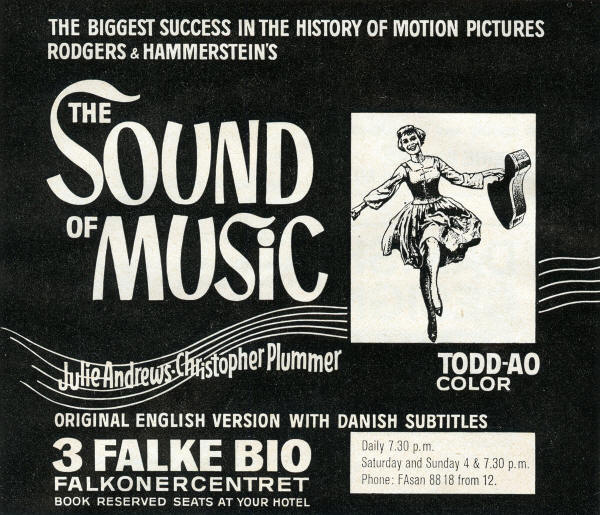 Danish
advertising for "The Sound of Music" at the 3 Falke Bio Todd-AO Theatre. Danish
advertising for "The Sound of Music" at the 3 Falke Bio Todd-AO Theatre.Kym Karath: Well, since I was five at the time, I only remember little bits and pieces, so I sort of get my information from everybody else too. I did it. I was there and I remember, bits and pieces like a 5 year old does, but I think I played around with that accent for a while. Duane Chase: This is great, but we all did do our own singing, we did have some other kids with us during the recording to give some volume to the recording. Speaker 3: Your high note. Duane Chase: Yeah, I know. I'm getting there. I'm getting there. Charmian Carr, who who played the oldest daughter, her younger sister, actually did the high note for me. Speaker 3: Darleen Carr. Duane Chase: That's the one note that I wasn't able to hit on my own, but you've got to give credit where credit is due. Moderator: You obviously went through so much training and preparation. Was it difficult to play children? You were all children yourself at the time, but you also had to be professional actors. Or did you kind of approach it that this was all a great adventure, and it was easy to kind of let loose and be kind of wild and reckless and naughty? Speaker ?: A lot of both, because we were professionals, and we showed up on time and did our job. But I think the thing that was intriguing about this group of kids was that we really were true children, and acted like true children. I think you can see that in the film. You can see that wonderful spirit that we had, and I think that's probably why we were even cast to begin with. He [Robert Wise] wasn't going for this sort of polished sort of Broadway-ish performance. He wanted us to look like, correct me if I'm wrong, real children up there. Don't you think? Robert Wise: Did you have to have schooling [on set]? Speaker 3: Oh, yes. Oh yes. Robert Wise: Because even though we were shooting Austria, there's a California law about children on the set, and movies have to have three hours of schooling every day. So we had to take a teacher with us when we were shooting over in Austria, so they could have be sure to have their three hours of schooling every day. Speaker 3: We had three hours of schooling. She was wonderful in that she took us down to the salt mines and counted that as Geography, you know, and shopping was math. [big audience laugh]. Speaker 4: We did a lot of "math" - still do [laughing]. Duane Chase: Well, on the topic of kids and Bob having to work with kids. When we were in front of the camera we had the job to do, but towards the end of the day, kids get tired. I've got probably five different episodes I can think of, where Bob could have drop-kicked me. In fact Bob, the very first thing we filmed together, which was the the bedroom scene, was towards the end of the day. I swear it was probably the first day of filming for me. Everybody else had gotten to go home except me. And I was supposed to come up from behind the bed with this big grin on my face. And so we'd roll the camera and my head would come up above the bedstead. No smile. Try it again. Ted would come up. No smile. Ted McCord, who was the cinematographer for the film, did something. He was standing behind everybody, and I don't remember what he did, but he did get me to smile and I swear Bob almost kissed him! But you know, kids are kids, and we had our episodes, off screen especially. It was great. I mean not bad things, just kid things. Speaker 4: I want to bring up one episode that I think Bob still to this day has not forgiven me for. Speaking of little kids ... remember when I fell through the screen? The screen behind Julie at the front door? There was this big giant screen to give a special effect of blurriness behind her, and I wanted to get from this side of the set to that side of the set that, and I thought, well, I'll just cut through there really fast. I tripped and fell and put a body size hole through the screen. Bob was so upset because he had to use the one that he didn't want to use. He had to use a different screen. I'm really sorry, Bob, I think it worked anyway [Bob Wise laughing]. Moderator: Duane, you mentioned Ted McCord, and he did such a beautiful job with the cinematography for this film. [audience applauding] I think of so many scenes, but the wedding scene in the Chapel is so beautifully shot and lit. Can you talk a little bit about working with Ted McCord on the film? Robert Wise: Ted is marvellous, and he just captured everything he wanted. For the the wedding scene, we went outside of the town to some monastery or something. He we got in there a day early to do a lot of pre-lighting and it just turned out beautifully on the screen. He's an outstanding cinematographer and great pleasure to work with. Duane Chase: Actually, can I jump in here? Moderator: Oh, sure, go ahead. Duane Chase: So we're on topic of the filming. Those opening shots, Bob -- before the days of Steadicam -- and here you have this huge 70 millimeter camera. How'd you guys do those shots? I heard you basically had it on a board hanging out of the side of the helicopter? How did you get such a steady shot before the days of Steadicams? |
|
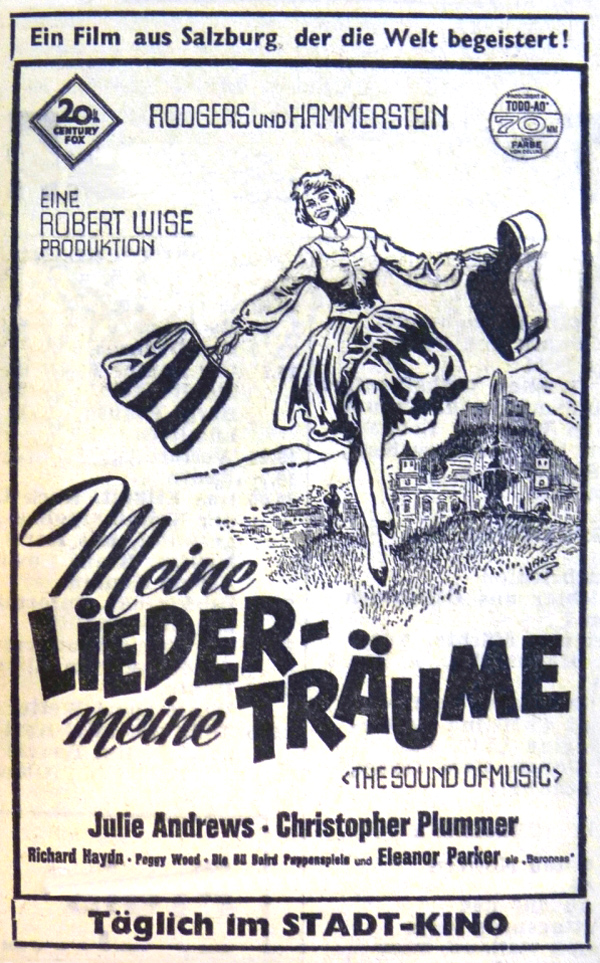 German
advert for "The Sound of Music" in Todd-AO at the Stadt Kino German
advert for "The Sound of Music" in Todd-AO at the Stadt KinoRobert Wise: I don't know! I don't know [cast and audience laughing]. I tell you one thing. When we came down, having done all the opening stuff with the helicopter and got down to where Julie is coming across the field toward us and the helicopter, I told Julie to let the helicopter get as close as she felt it was safe for her, and then to do a turn. And then she did that. And then when I started my shot on the ground - my shot, not the helicopter - I had her repeat the turn, and I cut in the middle of this turn. A lot of people think it's the same shot. That's cutting in action, you see, and that comes from my background in film editing. Now, if I hadn't had her to make the turn ... if I just gone out and shot straight on her, I think you would have realized it was a cut. But by doing it in that action, it just made it seem like one shot. Moderator: There's so much wonderful dance choreography throughout the film. You don't even realize it, sometimes. I wonder if you could all talk a little bit about working with the choreographers Dee Dee Wood and Marc Breaux, and especially some of the numbers like "So Long Farewell". The first one, which is so beautifully choreographed for the children. Robert Wise: You ladies talk about that. Speaker 3: That was my my favorite number. It really was. It was the most fun for me to do because my background really has always been in dance. That maybe was the only number that they really utilized that with me, but they were fabulous choreographers, wonderful choreographers, and they made it look so natural, that it didn't look overly choreographed. Speaker 4: I just remember the first day on the set, we were choreographing the cuckoo song. What do we call it? "So Long Farewell" - I must be tired! Anyway. I mean, we had it all figured out. They had a stage with stairs on it beforehand. Just, you know, wooden stairs that we all figured it out well in advance. And again, because we rehearsed it and rehearsed and rehearsed it, we could do it in our sleep. Still can. Kym Karath: I remember the singing was very easy for me to remember, and dialogue as well, but dance was a little bit more of a challenge because I was really little. The steps for Mirabell Gardens were big. We went back just two years ago and they're not. They're small, but I'm a lot taller, I mean I watch the film sometimes and I see myself like overstepping things, in the way a little kid does. I'm sort of clutzy, so that's what I see when I watch it. But it was a little hard for me, because I was little. Duane Chase: Well, of course working with Marc Breaux and Dee Dee Wood really was wonderful. It was just a fun experience, even for all the rehearsals that we had to go through. I just realized, in watching the film this time ... when we had to do a little step routine down there in the Mirabell Gardens, when we were running up and down the steps. I FINALLY saw why I had to make those two last steps in one. You cut me off! You, Debbie! Yeah, you cut right in front of me. I never remembered why I had to make that giant jump. Now I know. [Audience and group having a good time laughing] Debbie: All right. I can say this because Nicholas Hammond isn't here. They actually made him look good. They made him look like he didn't have two left feet. You know which he does [Group laughing]. Duane Chase: There was another thing when they did the Laendler. I had to look pretty clutzy with Julie, and it upset me so badly, and I was such a pill, that Bob actually let me dance, what little bit I knew of the Laendler with Julie straight through, without looking like a klutz. And these are some of these things that Bob had to put up with when he was working with kids. Robert Wise: Not hard to put up with. Moderator: Was it difficult for all of you to to leave that behind at the end of the shooting? I mean, you obviously had formed a kind of family bond and you've kept it up - obviously over the years but was it hard to leave those characters behind? Speaker 5: Yeah, it really was, but this film has never gone away. This film is multi-generational [audience applause], and so I feel as though we've all ... because of that, we've all sort of held on to that for our characters. We were so much of those characters - were who we are, as individuals, as people. It's real good typecasting. Did I answer your question? Moderator: Bob, you've made so many films in so many different genres. Were you at all surprised when "The Sound of Music" turned out to be so phenomenally popular? Probably the most popular of any of the films that you've directed during your career. Robert Wise: Yes, I've done a couple of other musicals like "West Side Story" [and "STAR!", ed]. This is the most popular because it's a family story. I think it reaches out to people of all ages and in all countries, you know. I think it's a very universal appeal. And that's what I think is one of the big pluses with it. Moderator: Did you have it have any contact with the von Trapp family during the making of the film? Robert Wise: No, we didn't. We had our script and it was based on what we knew to be pretty much the truth, and we just went with it. I think Maria was around once, sometime. Where was it, in Austria? She was around. As a matter of fact, I put her in a shot. I put her way in the background crossing through the shot. That's the only kind of contact we had with her. Audience question: This is my favorite movie of all. Robert Wise: Thank you. |
|
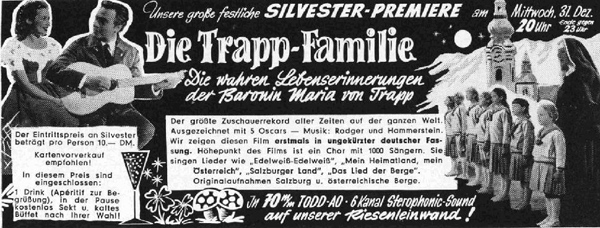 "The
Sound of Music" New Years Eve re-issue premiere at the Schauburg Cinerama
(Karlsruhe) in "70 m/m Todd-AO and 6 channel stereophonic sound". For the
first time uncut version (now including Nazis!) in Germany. "The
Sound of Music" New Years Eve re-issue premiere at the Schauburg Cinerama
(Karlsruhe) in "70 m/m Todd-AO and 6 channel stereophonic sound". For the
first time uncut version (now including Nazis!) in Germany.Audience question, continued: Every time I see it I'm always struck during the puppet scene, where Frederick [Nicholas Hammond] almost looks like he has a crush on her [Julie Andrews]. Was that deliberate? Robert Wise: I think he probably did have a crush on her, but it wasn't intended to show anything [Laughing with group]. Julie is really such a marvellous person to work with. She is just great. I did another film with her. It was an original thing titled "STAR!" [Audience applause] and whoever saw that or not, it was a good film. It didn't get the notice or acclaim that "The Sound of Music" did. It's it's one of my favourite films. I think Julie did a marvellous job in it. Audience question: Is there anything you would change about the movie if you had to do it all over again? Robert Wise: I don't want to sound smug, but I don't think so. Speaker 5: Recast some of these kids? Robert Wise: Yes, maybe recast some of these kids [Group is having fun]. But, you know, I don't think it's a perfect movie. But you start off with a fine script, a lovely score and the cast is right, and get enough time and money to shoot it properly, and that's important. I think it stands on its own, and I don't know anything, I'd change, no. Audience question: How was Eleanor Parker chosen for the role of the Baroness? Robert Wise: I don't remember now, it's been a long time ago. I didn't know her, but I'd seen her work in other films and I thought she had the look of quality and was good actress. That should be just fine in there, and in contrast to [type of person] Julie, and I thought she did a fine job. She was just excellent. [Audience applause] |
|
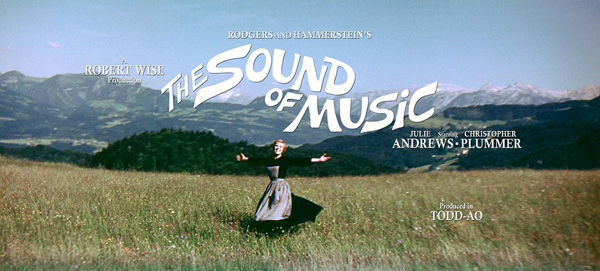 Poster
design: Schauburg Cinerama, Karlsruhe, Germany Poster
design: Schauburg Cinerama, Karlsruhe, GermanyAudience question: Have any of you met any of the [real] von Trapp children after the film, and are any of you still involved in the acting field? Speaker 5: We met them on Oprah [US TV show]. I mean, where else would you meet them? On Oprah, right? And they're very nice. Great people. They invited us to the von Trapp Lodge and Charmian and Duane and I and our families went, and it was just a wonderful experience to get to know them, and listen to some of the stories from the elder von Trapps. Some of the real stories and how they're a little bit different than the Julie Andrews side of things. Speaker 3: We met in New York and actually we met all the children. It was wonderful. We were honored by the Austrian Government and awarded the Mozart Medallion, it's called. They had us all fly into New York and all of the von Trapps were given the ... was it the Presidential award for Austria? They were honored as well, and it was probably one of the most touching evenings that I could ever remember. We all sang. It was around Christmas time, wasn't it? And we sang Silent Night and there wasn't a dry eye in the house. It was wonderful. Duane Chase: ... and "Edelweiss". Which has kind of become the de facto national anthem for Austria. Speaker 4: According to Ronald Reagan, it is. Duane Chase: What's interesting is actually, I have kind of stayed in touch with the character I played; Kurt. His real name is Werner [von Trapp]. I just got a card from Werner's wife several weeks ago, after I had sent an e-mail to the Lodge just to say Hi and see how everybody was doing. Especially asking about how Werner*) was doing. He's still with us and it's nice to be able to kind of maintain that touch with the family. They were very, very generous and gracious to us when we went to visit. Audience question: Were there any major scenes filmed that didn't make the final cut of "The Sound of Music"? Robert Wise: No, I don't think so. A man named Ernest Lehman did the screenplay. He's a fine screenwriter, and it's fine. I think we didn't lose any scenes or anything. It was all shot just it was in the script. Speaker 1: Well, it's a brilliant, BRILLIANT piece of filmmaking. It has stood ... MORE than stood the test of time. I think it just gets better and better every time. I'm sure everyone here in the audience has seen it many times [Warm audience applause]. We'll see it many more times. Please join me once again in welcoming Mr. Duane Chase, Kym Karath, Debbie Turner, Heather Menzies and most especially Robert Wise. And we hope we see you for the rest of this retrospective tribute to Bob Wise. Moderator: Thank you very much. Thank you. Thank you all for coming. *) Werner von Trapp passed away 11. October 2007, age 91. |
|
| Go: back - top - back issues - news index Updated 22-01-25 |

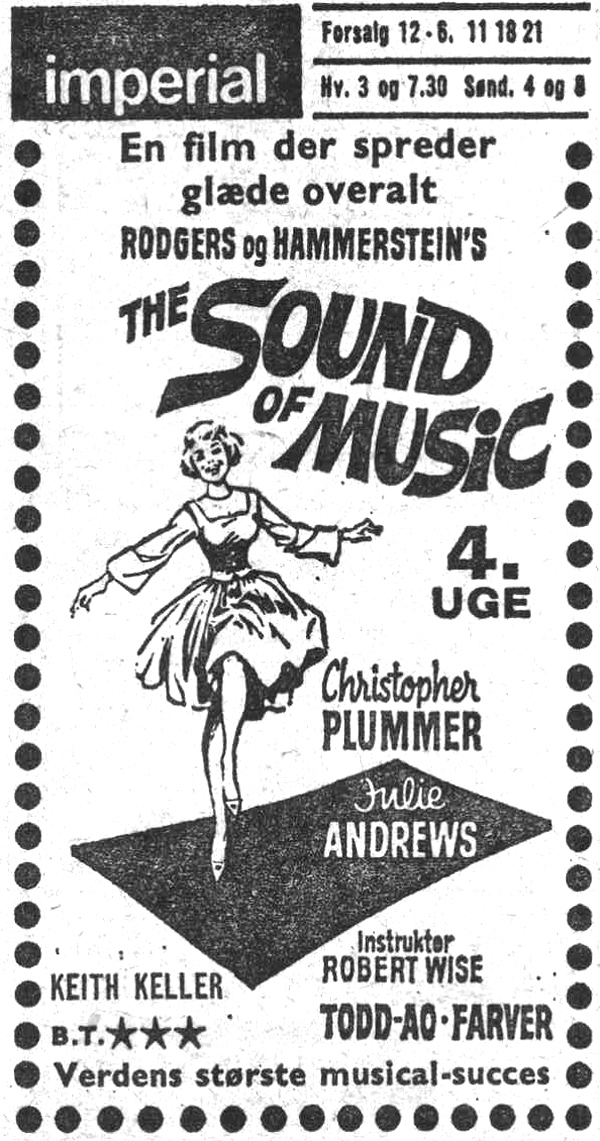 Danish
premiere of "The Sound of Music" in Todd-AO "and color" at the Imperial Bio, Copenhagen
Danish
premiere of "The Sound of Music" in Todd-AO "and color" at the Imperial Bio, Copenhagen